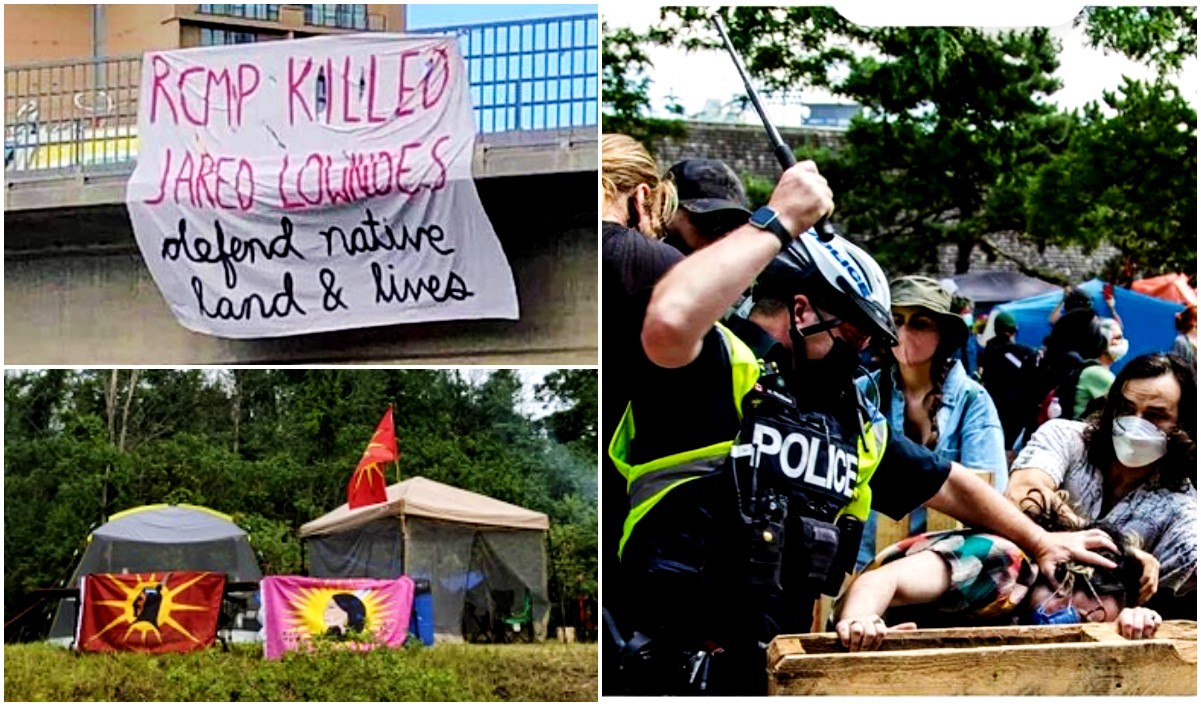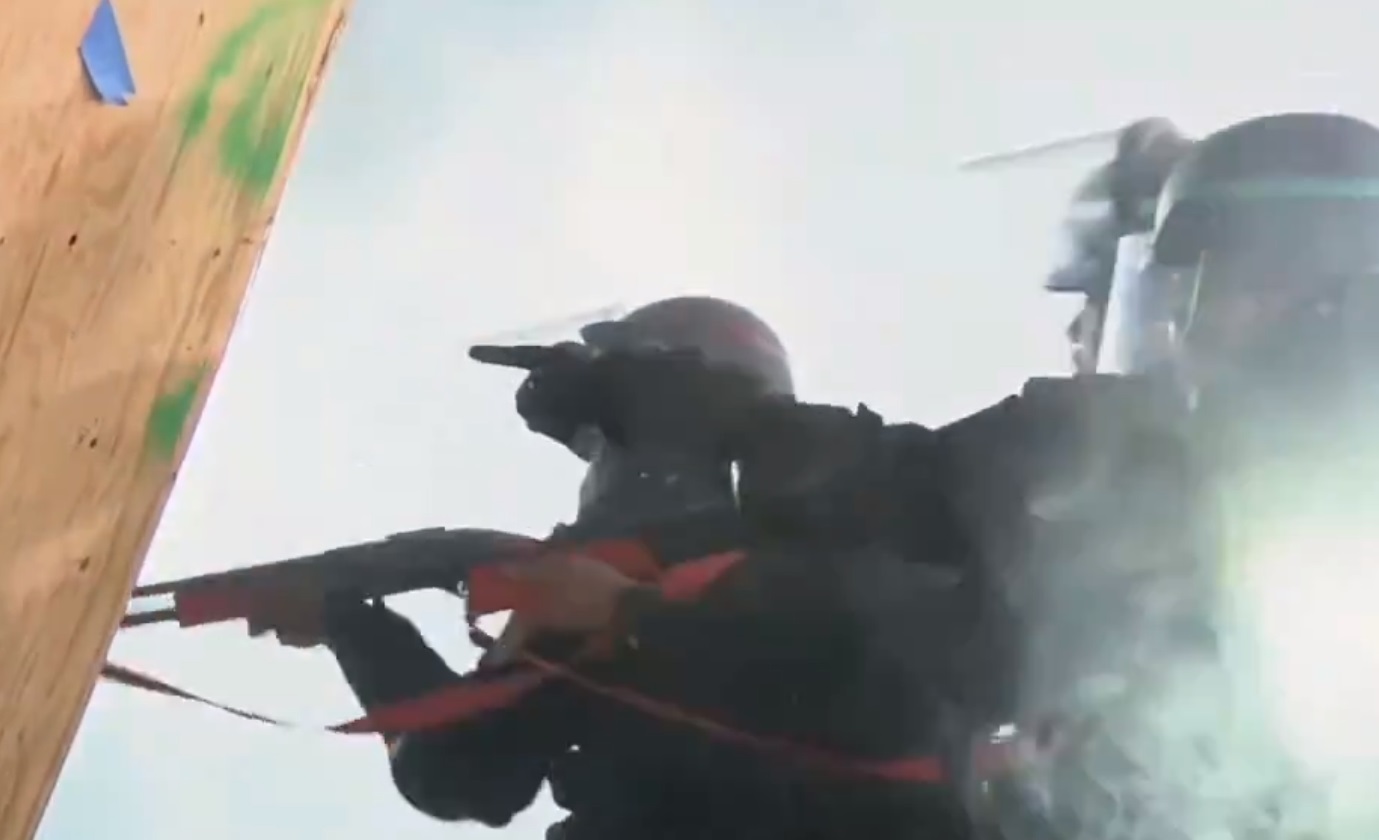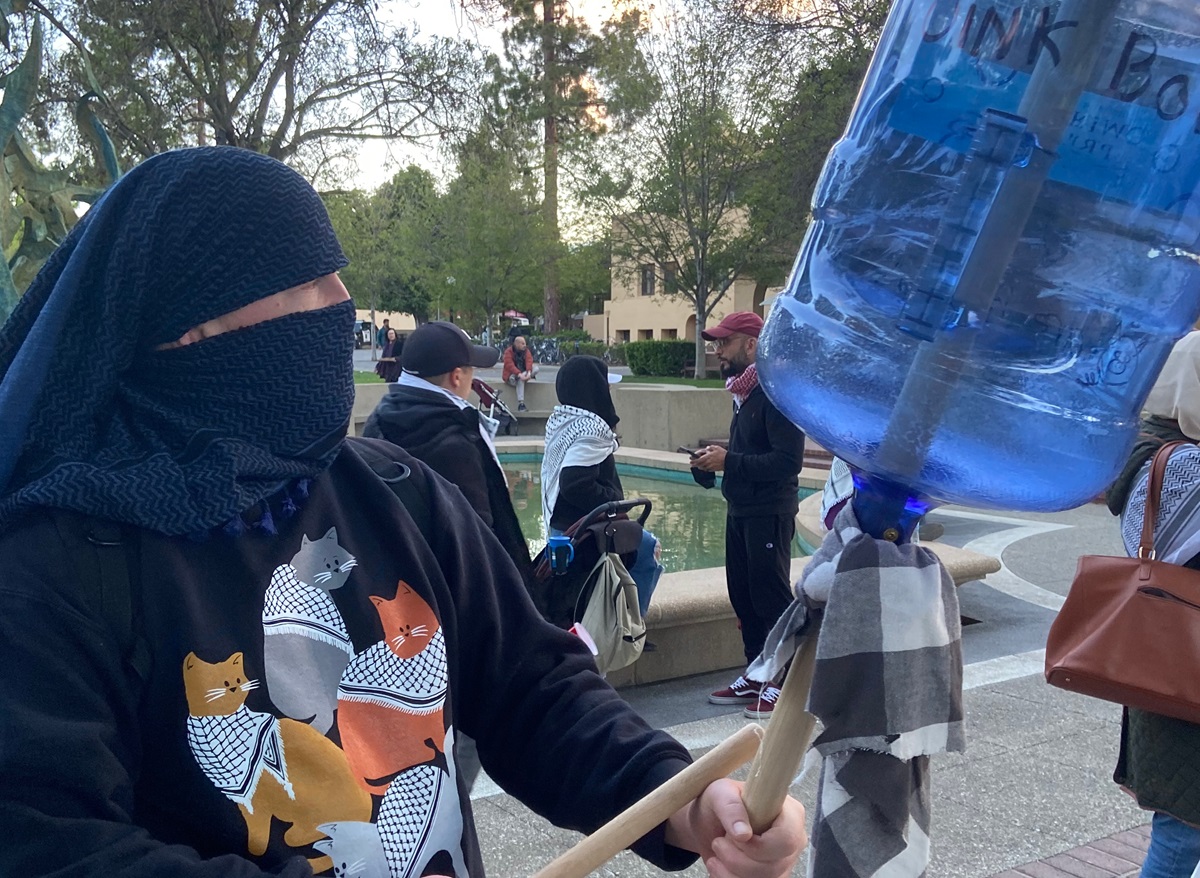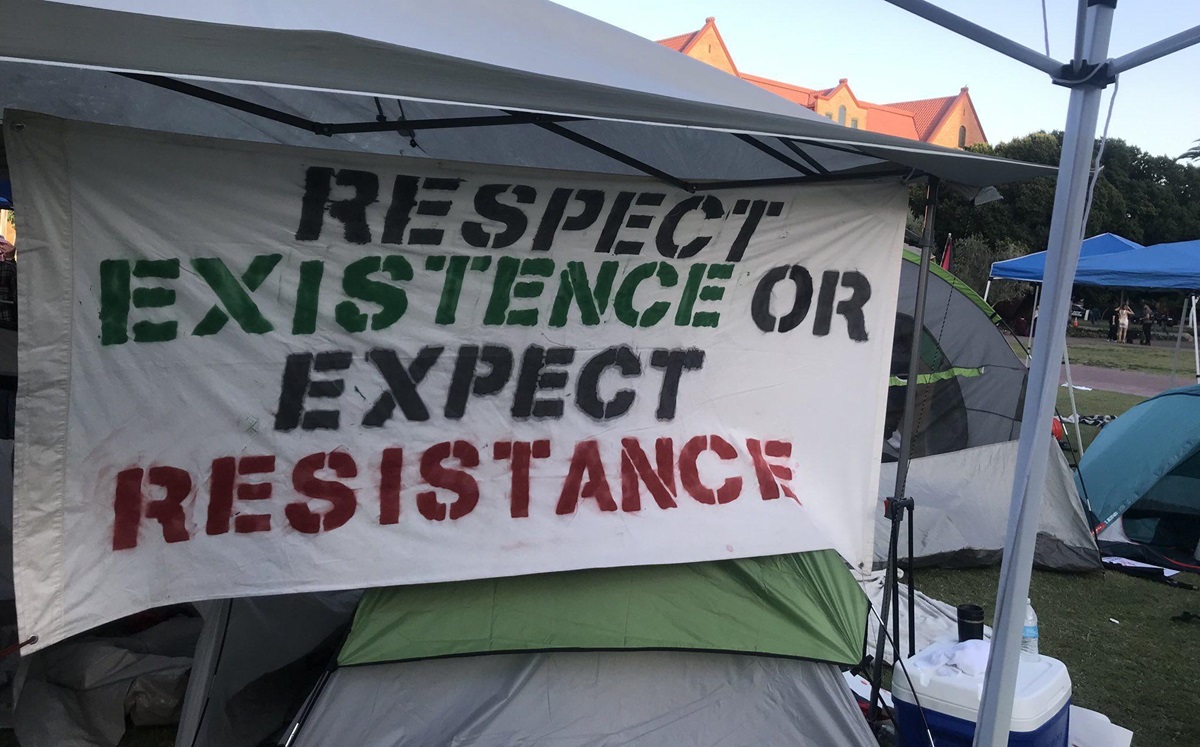Filed under: Canadian Tire Fire, Featured

In a continuing trend, this week brought a wave of encampment evictions across multiple cities, with new levels of police violence. Communities mourned and marched for Jared Lowndes, a Wet’suwet’en man killed by police earlier this month. New details were released about the extent of vandalism against churches in Vancouver over the past month, while new actions went down in Surrey and Cowichan Valley. In rural Saskatchewan, a project was launched to facilitate land sharing between settlers and Indigenous people.
Holland’s voice was nearly drowned out by drums just outside the detachment doors. Over 100 people gathered to mourn Jared Lowndes & protest the manner of his death.
Family of slain Indigenous man confront RCMP in Campbell River – Lake Cowichan Gazette https://t.co/D4Vse3WkKo
— Arlene Christie (@HighwayOfTearz) July 21, 2021
Communities across the country continued to face the threat of wildfires. First Nations communities continue to be most drastically impacted, with multiple remote communities in Manitoba, Northern Ontario, and BC being evacuated this week.
In a week where vulnerable people, especially Indigenous folks, were displaced on a wide scale by both environmental catastrophe and the criminalization of poverty, while simultaneously the richest man in the world shot himself into space (and sadly returned), the crisis of capitalism was truly stark.
"It's a very difficult situation for them."
With more than 1300 people having to leave their homes, @redcrosscanada's Jason Small shares the latest on the evacuation of four Manitoba First Nations because of wildfires. pic.twitter.com/aW6xrCiZXR— Global Winnipeg (@globalwinnipeg) July 21, 2021
We also want to give a shout-out to this week to the exciting return of a few anarchist projects. The Halifax Anarchist Bookfair announced they will be back for a fourth year on September 4. Proposals are due by August 4! As well, the excellent anarchist podcast From Embers has returned from hiatus, digging into Fairy Creek forest defense on their first episode back.
#JusticeForJaredLowndes Actions Spread Following Wet’suwet’en Man’s Murder by RCMP
Following the brutal July 8th police murder of 38 year old Wet’suwet’en man, Jared Lowndes, a number of actions were held this past week in his memory and in outrage of his killing. Jared was shot six times and killed outside of a Tim Hortons in Campbell River, BC after RCMP boxed his car in and set a police dog on him inside his car. The police dog was killed as Jared tried to protect himself and his own dog from its attacks. Following Jared’s murder the RCMP organized a public procession and funeral for the police dog which Jared’s family say has fueled racism in the community. Media coverage has consistently focused on the death of the dog rather than Jared’s murder.
Jared’s murder is the third time in recent months that police dogs, who have been injured or killed while attacking Indigenous people, have been the focus of more public mourning than the humans murdered by the police. In late June, Lionel Ernest Grey, from the Gift Lake Metis Settlement, was killed by RCMP. A 28 year old man was killed by police near Cold Lake, Alberta on June 20th. In both cases, the police dogs injured or killed during the killings were the focus of the media surrounding the incidents.
In Campbell River, a rolling memorial was held on July 20. Mourners, including Jared’s mother, carried his ashes to multiple locations in the city including the Campbell River RCMP detachment. While there, Jared’s mother expressed her fury at the police for killing her son. As reported by the National Observer, Jared’s mother told the RCMP sent to speak to her during the memorial: “You don’t understand! You were created to control and kill Indians and you have not stopped.”
Actions calling for #JusticeForJaredLowndes also included a banner drop off a bridge in Kelowna, as well as one in Vancouver.
My Boy #JusticeForJared 🧡🧡 pic.twitter.com/p7Px7M8ixE
— ©oke 🅱oY$ Cj (@G2S_GeRoNiMo) July 20, 2021
In Vancouver and Edmonton, marches were held as well.
Fuck the #RCMP. #JusticeForJared pic.twitter.com/UrqPmj6s57
— Defund604Network (@defund604) July 20, 2021
The memorial for Jared set up outside the Tim Hortons where he was killed has been destroyed multiple times.
Jared Lowndes, a Wet’suwet’en father of two was shot and killed by the RCMP in Campbell River last week. A memorial honouring him and calling for justice keeps being destroyed — including the signs handwritten by his two daughters, ages 6 and 13. Story: https://t.co/sQ4cMNHr6o pic.twitter.com/Kj6DN0EURd
— Lisa Steacy (@lisa_steacy) July 14, 2021
Shortly before his death, Jared wrote the following on Facebook:
I’m now in my late 30s, and my daughter, dog and I are homeless, living out of my car. All because I can’t trust. The police, doctors, social workers should have kept me safe. I’ve done everything in my power to make sure my children don’t have to suffer or experience anything like I did. I’ve been sober and quit partying 8 years ago.
Rest in Power Jared Lowndes, and solidarity with all those mourning his death and fighting against the murderous colonial cops.
Encampment Evictions Continue in Toronto and Vancouver
This week saw a drastic escalation in encampment clearing tactics in Toronto. First on July 20, police cleared an encampment with 26 residents at Alexandra Park. Police repeated tactics used in previous encampment attacks and evictions, showing up in large numbers, fencing off the park, and destroying residents’ belongings and housing. They also arrested 9 people, 7 of whom were charged for trespassing.
There are no City housing or outreach workers here – where residents of the park are being ejected into the street on Ryerson. Piles of everything people own on sidewalks, carried and in carts as they move on to, likely, the next park. There is no permanent housing on offer. pic.twitter.com/RR6mUfA7K4
— Shelter and Housing Justice Network (@SHJNetwork) July 20, 2021
However, nothing could prepare the city for the show of force the next day, at an encampment by Lamport Stadium. This encampment has been hotly contested, and was cleared at least once before, in May of this year. It is estimated that 14-17 people were living there.
The first City vehicles arrived before 5am. By 7am, a large collection of on-foot, bike, and mounted police, had amassed near the stadium. Support groups, who had been expecting action against the encampment, were present in small numbers as well, and quickly put out further calls for support.
this is what we’re up against, please turn up pic.twitter.com/kGDf9xRTvo
— Michael DeForge (@michael_deforge) July 21, 2021
Again, police fenced off the area around the encampment, barring journalists or further supporters from entering. Those inside the fencing surrounded the encampment, linking arms and holding up makeshift barriers. Police responded with a stunning display of violence, shoving those gathered to the ground, using forceful arrest techniques, deploying pepper spray, and ultimately sending multiple people to the hospital with injuries ranging from concussions to broken bones. 31 people were arrested, including encampment residents, supporters, journalists, and legal observers.
Toronto police waging war with the homeless and beating protestors trying to protect them
THIS IS CANADA 🇨🇦
ACAB
— StanceGrounded (@_SJPeace_) July 22, 2021
Supporters then moved to two police stations where people were being held. At one, police continued to attack the crowd, again deploying pepper spray and arresting more people. Finally, supporters were forced away from the station and gathered in a nearby park.
Skyler Williams from #landback @1492LBL speaking with to the crowd. He was hospitalized earlier today by TPS during encampment defense actions. He urges crowd to stay connected and that people deserve homes. pic.twitter.com/ojF3ddXS2r
— The Hoser (@TheHoserMedia) July 22, 2021
Throughout the ongoing ordeal of encampment evictions, the rhetoric spewed by both the mayor and police has been particularly vile and deceitful. Mayor John Tory has multiple times repeated that police were only deployed in such large numbers to quell rowdy protesters, which is demonstrably untrue. He has also stated that encampments had to be cleared because they were “interfering with programming in the park for low-income children.” Two days after the clearing of Alexandra Park, it was observed to be closed for a film shoot.
Behold the privatization of the public space of parks. Where are the camps for "needy" children described by @JohnTory? The lies are so audacious they're beyond comprehension. https://t.co/SmS142rnTq
— Diana Chan McNally (@Diana_C_McNally) July 22, 2021
Unsurprisingly, the police themselves will share whatever narrative they please; in one instance tweeting that police had been sprayed with pepper spray, omitting that it was a police officer himself who misfired.
A cop sprayed himself with pepper spray, which multiple people witnessed and this is how the police spin it. Remember never trust anything you hear from the police. They are lying to you. https://t.co/XplQsoVQbA
— Nicole (@nicole__abbott) July 22, 2021
With another raid expected, this time on Toronto’s Moss Park encampment, the struggle continues.
In Vancouver’s CRAB Park, an encampment of about 30 people was cleared on July 22. Police, rangers, and City staff arrived in the park in the morning to announce that all residents must leave or face arrest. Most of the encampment was cleared by early evening, though from some reports on social media, it appears that some residents were able to stay. Following the eviction, police and city workers returned to fence off the perimeter of the park.
An open letter and petition released by a group called CRAB Park Solidarity explained:
On July 8th, the Vancouver Park Board issued an Order from the General Manager against any camping in CRAB Park in the Downtown Eastside (DTES) and informed homeless residents that they must vacate the park or face enforcement.
With the recent Order — in conjunction with the Memorandum of Understanding on Support for Unsheltered Vancouver Residents (MOU) signed March 31, 2021 by the Province, City of Vancouver and Vancouver Park Board — there is currently no legal place for daytime sheltering for homeless people and almost no legal place for overnight sheltering in the DTES.
The letter also pointed out that many of the park residents are Indigenous, and that the evictions violate the UN Declaration on the Rights of Indigenous Peoples. The petition included a number of demands, including an immediate moratorium to enforcement of the Parks Control By-law and the Order evicting residents from CRAB Park.
Kahnawake Land Back Camp Going Strong Nearly 1 Month In, Chateauguay Claims No Development Approved
The site of a potential 290-home development on forested land just outside the official borders of Kahnawake, in so-called Quebec continues to be occupied by Kahnawa’kehró:non attempting to protect the land from development. The occupation began on July 1st.
Yesterday @Sarah_Rotz and I had the privilege of expressing our solidarity with Kahnawake land defenders on unceded land between Kahnawake and Chateauguay slated for a large residential housing development. #landback pic.twitter.com/kiTOg1VakR
— Daniel Rück (@danrueck) July 17, 2021
Kahnawake News has reported that Chateauguay city officials claim no development has been officially approved for the site. However, developer RMR Leblanc’s website featured, until July 12, maps depicting the potential project. The Mohawk Council of Kahnawake has insisted that their last conversations with the mayor of Chateauguay left them with the impression that the development was indeed going ahead.
While there is conflicting information around the status of the project, it appears clear that the land defenders will stay put on the land for the foreseeable future. We wish them all the best!
Quebec LNG Plant Project Cancelled
The final death knell has sounded for the proposed Liquefied Natural Gas (LNG) plant in Saguenay, QC. On July 21st, the Quebec government refused to approve its construction, after having previously supported and promoted it. According to the CBC, “the $14-billion project was composed of a plan to build a 780 -kilometre natural gas pipeline from northern Ontario to Saguenay, and a separate project to build a plant to liquify the gas in Saguenay and load it onto tankers.” With the plant’s construction now cancelled, the pipeline is most likely dead as well.
The project cancellation cannot be attributed to any altruism or benevolence on the part of the Quebec government, however. The news comes after months of opposition from various groups. Notably, two weeks before the cancellation, three Innu First Nations (Mashteuiatsh, Pessamit and Essipit) came out in opposition to the project, vowing to not let it be built on their lands. As always, resistance to development by Indigenous and activist groups deserves the credit for these victories!
Anti-Church Actions Continue
An orthodox church in Surrey, BC, was destroyed this week in a fire that police are calling “suspicious.” Given the recent string of actions against churches in response to the confirmation of mass graves at residential schools, it seems likely that this is another such action. Less than a week earlier, a person was seen on camera attempting to burn the building, although police have not officially linked the two events.
A large cross that for decades stood atop a popular outlook in the Cowichan Valley on Vancouver Island was removed this week and so far no one knows why.https://t.co/3HKlp2leJl
— CBC British Columbia (@cbcnewsbc) July 19, 2021
In Vancouver, police recently released a list of all documented acts of vandalism against churches since June 2 of this year. The list, which includes graffiti, smashing of windows, and an arson attempt, totals 13 acts of vandalism or mischief. No one has been arrested in connection with any of the actions.
Finally, in a mysterious and striking act against Christian symbolism, a large cross standing at a lookout over the Cowichan Valley disappeared this week. While, again, no one has claimed the action, it is certainly befitting of the moment.
Indigenous and Settler Land Sharing Project Launches in “Saskatchewan”
Since August 2020 a group of farmers and ranchers have been coming together, with the help and direction of Indigenous folks, to create a network to share access to land. The Treaty Land Sharing Network, which officially launched on July 15th says on its website, “We are committed to implementing the treaty relationship, engaging in ongoing learning together as we practice being treaty people, and establishing a different way forward for rural Saskatchewan.”
“No ecosystem is whole and functioning unless it has Indigenous Peoples accessing it." @briarpatchmag on Saskatchewan's Trraty Land Sharing Network. https://t.co/nTglCMXVGH
— Sask Dispatch (@SaskDispatch) July 5, 2021
The Network has been a year in formation and this summer it will be put to the test when they start implementing the land share project. The project includes land owners putting up signs, on their property, indicating they are participating in the land sharing project and listing a contact number. Indigenous land users accessing the land are asked to contact land owners in order to receive vital information and ensure safety, according to the website. Participants in the Network have had to consider how the relationship can still create a power imbalance between land owning settlers and Indigenous land users. Phillip Brass, an Indigenous hunter who has been involved since the very first conversation that started the network has said, “Reconciliation isn’t about feel-goody, sitting-around kumbaya scenarios. It’s about simply relinquishing your power and privilege on land that you occupy and acknowledging that the fee-simple land […] system […] is based on theft.”
While the project has some clear issues we are excited to see people embarking on a tangible path to decolonizing at least some of this land. With precious few attempts underway to figure out how settlers and Indigenous people can share land that we live on we are hopeful there will at least be a starting point on which to move forward with this fundamental work.
Follow Canadian Tire Fire on Twitter here.





